#zushi yoshitaka
Explore tagged Tumblr posts
Text
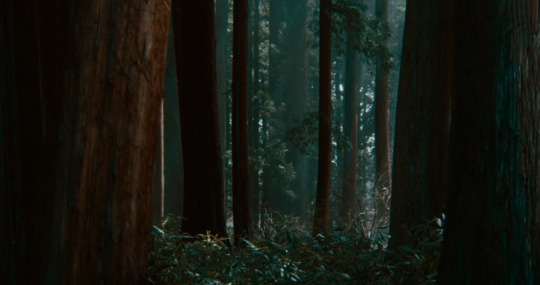
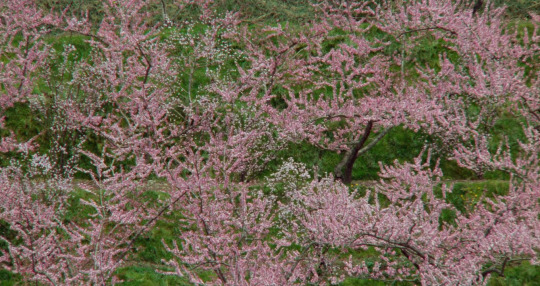
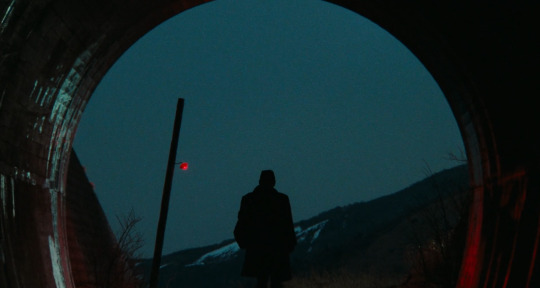
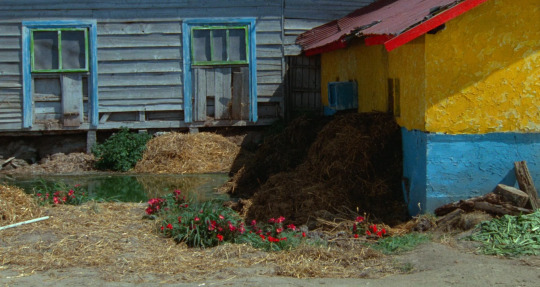



夢, (1990) Dir. Akira Kurosawa
#dreams#夢#akira kurosawa#akira terao#mitsuko baisho#toshie negishi#mieko harada#mitsunori isaki#toshihiko nakano#yoshitaka zushi#hisashi igawa#chosuke ikariya#movie stills#movieedit#filmedit#cinema#screencaps#cinematography#cinephile#film photography#movie#cinemetography#mine#films
203 notes
·
View notes
Text






























dreams, akira kurosawa 1990
#夢#dreams#akira kurosawa#1990#akira terao#mitsunori izaki#toshihiko nakano#mitsuko baishō#misato tate#yoshitaka zushi#martin scorsese#hisashi igawa#toshie negishi#voices in the wind#throne of blood#seven samurai#dersu uzala#harakiri#55 days at peking#lust for life#at eternity’s gate#stromboli#nordwand#the lord of the rings#porcile#andrei rublev#war of the worlds#pather panchali#the stranger#park chan-wook
2 notes
·
View notes
Photo










dodes’ka-den (jp, kurosawa 70)
#dodes'ka-den#kurosawa akira#zushi yoshitaka#sugai kin#tonomura toshiyuki#minami shinsuke#kusunoki Yûko#fukuzawa Yasumichi#Saitô takao
18 notes
·
View notes
Photo










Dodes'ka-den (1970)
Directed by Akira Kurosawa
どですかでん
#akira kurosawa#dodes'ka-den#dodeskaden#どですかでん#dodeskaden screenshot#dodescaden screens#dodeskaden screengrab#hideo oguni#shinobu hashimoto#shūgorō yamamoto#kurosawa cinematography#cinematography#yasumichi fukuzawa#takao saitô#yoshitaka zushi#kin sugai#toshiyuki tonomura#shinsuke minami#yuko kusunoki
11 notes
·
View notes
Photo


Dreams | Akira Kurosawa | 1990
Yoshitaka Zushi, Akira Terao, et al.
30 notes
·
View notes
Photo

Dodes’ka-den (1970). Various tales in the lives of Tokyo slum dwellers, including a mentally deficient young man obsessed with driving his own commuter trolley.
Told in vivid colour, this film is personal, emotional, evocative in all the ways Kurosawa films often are. The heart of this film is worn on its sleeve, and the effect is a brilliantly affecting series of viginettes and character studies that you’ll be thinking about long after the credits roll. 7.5/10.
#dodes'ka-den#dodeskaden#1970#Oscars 44#Nom: Foreign Film#Akira Kurosawa#Hideo Oguni#Shinobu Hashimoto#Shûgorô Yamamoto#Yoshitaka Zushi#Kunie Tanaka#Jitsuko Yoshimura#Hisashi Igawa#Tatsuo Matsumura#japan#japanese#class#poverty#romance#7.5/10
2 notes
·
View notes
Photo










Dodesukaden, 1970 Dir. Akira Kurosawa
#Dodesukaden#Akira Kurosawa#Yoshitaka Zushi#Kin Sugai#Toshiyuki Tonomura#Junzaburo Ban#Shinsuke Minami
1 note
·
View note
Photo
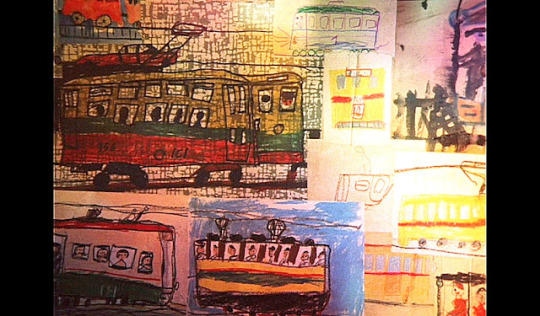
Dodes'ka-den (Akira Kurosawa, 1970)
Cast: Yoshitaka Zushi, Kin Sugai, Junzaburo Ban, Kiyoko Tange, Hisashi Igawa, Hideko Okiyama, Kunie Tanaka, Jitsuko Yoshimura, Ryo Sawagami, Yoko Kusunoki, Noboru Mitani, Hiroyuki Kawase, Hiroshi Akutagawa. Screenplay: Akira Kurosawa, Hideo Oguni, Shinobu Hashimoto, based on a novel by Shugoro Yamamoto. Cinematography: Yasumichi Fukuzawa, Takao Saito. Art direction: Shinobu Muraki, Yoshiro Muraki. Film editing: Reiko Kaneko. Music: Toru Takemitsu. Akira Kurosawa's first film in color, Dodes'ka-den was a critical hit, earning an Oscar nomination for foreign language film, but a commercial failure, sending the director into a deep, near-suicidal depression. It's a curious grab-bag of stories of people living in a trash dump, their lives connecting only tangentially for the most part. It has the appearance of such post-apocalyptic films as Children of Men (Alfonso Cuarón, 2006), Delicatessen (Marc Caro and Jean-Pierre Jeunet, 1991), Escape From New York (John Carpenter, 1981), Snowpiercer (Bong Joon-ho, 2014), Stalker (Andrei Tarkovsky, 1991), and The Bed Sitting Room (Richard Lester, 1969), though its setting is on the fringes of the actual 20th-century Japan -- apocalypse nigh, if you will. The title comes from what is perhaps its central figure, the mentally challenged Roku-chan (Yoshitaka Zushi), who is obsessed with streetcars and chugs through the dump chanting the nonsense words of the film's title, meant to be an evocation of the sound of the tram on the tracks.
3 notes
·
View notes
Photo

6.14.17
#watched#film#letterboxd#dodes'ka-den#akira kurosawa#yoshitaka zushi#kin sugai#toshiyuki tonomura#shinsuke minami#yuko kusunoki#kiyoko tang#michio hino#kunie tanaka#jitsuko yoshimura#hisashi igawa#kamatari fujiwara#criterion collection
1 note
·
View note
Photo
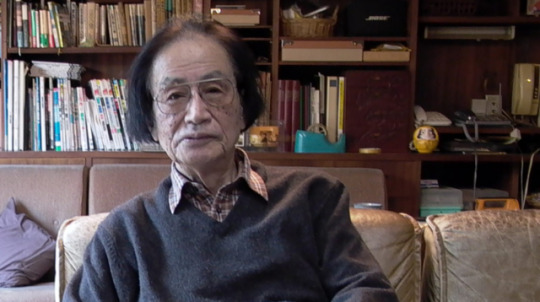

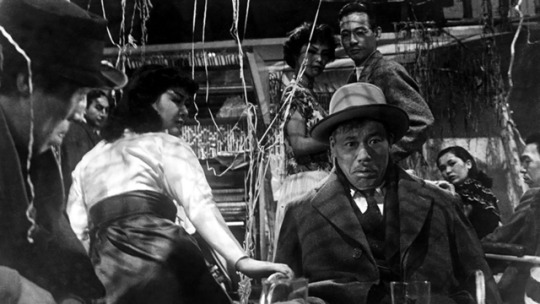
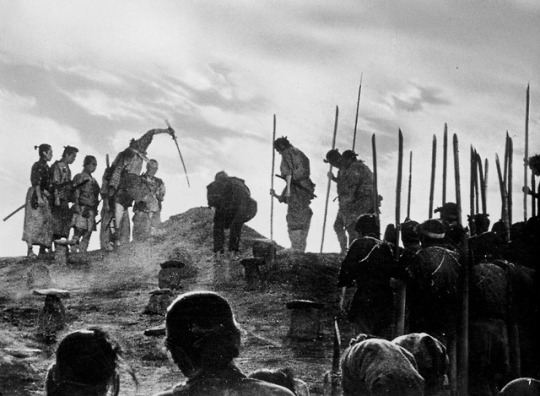
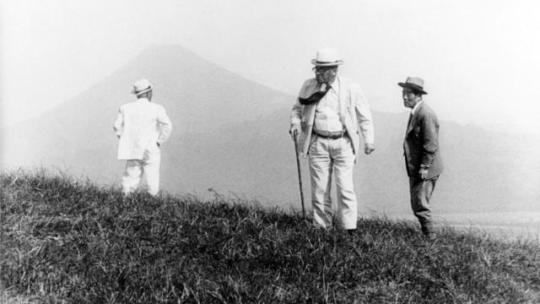
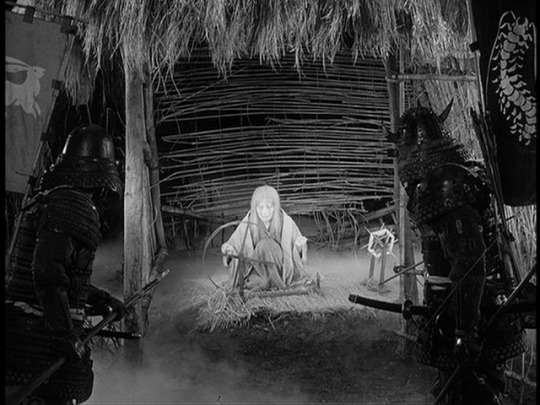
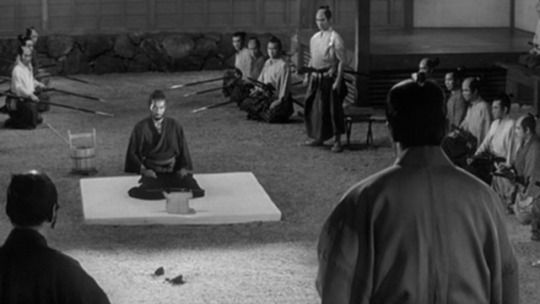
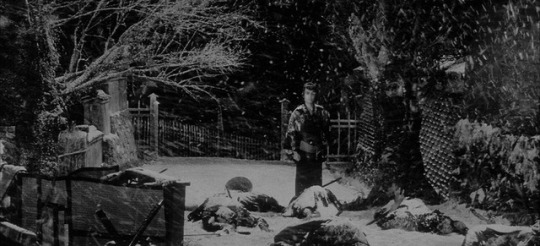
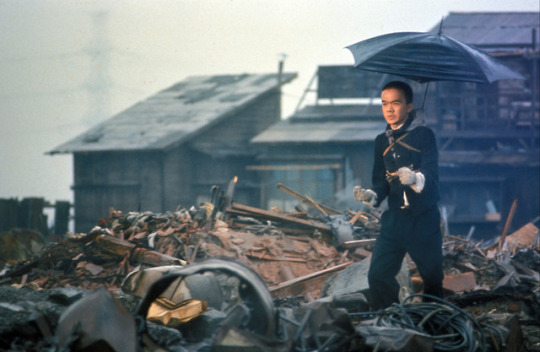
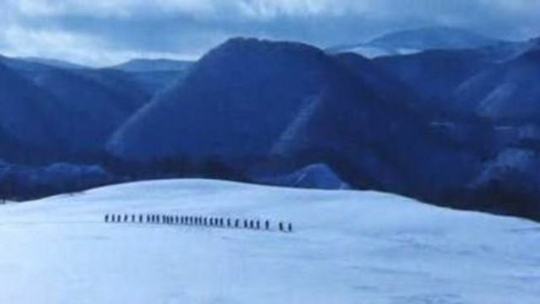
How tragic that man can never realize how beautiful life is until he is face to face with death.
Screenwriter Shinobu Hashimoto (April 18, 1918 -- July 19, 2018) was one of Akira Kurosawa’s least-known collaborators, if only because he was not part of the director’s photogenic actors. But Hashimoto was more than just a Kurosawa collaborator. The screenwriter was raised in the Japanese countryside and was discharged from military service in World War II because of tuberculosis -- forcing him to spend four years in a veterans’ hospital. A fellow patient one day handed Hashimoto a magazine on cinema and, poring through the contents, it was then Hashimoto decided to pursue a career in filmmaking. He sent a screenplay to Mansaku Itami (a major figure of 1930s Japanese cinema, but whose films have largely not been distributed to the West), who was so impressed that he became the young Hashimoto’s mentor until his death in 1946.
Rashômon was Hashimoto’s screenwriting debut (and what a hell of a debut). Over the next several decades, Hashimoto’s films -- regardless of the director or actors involved -- would explore humanity from its most altruistic to its most unconscionable moments of cruelty. Hashimoto retired in 1982, having been with Toho Company for almost the entirety of his career. He passed away at a hundred years old in July -- the last of Kurosawa’s regular screenwriters living, and arguably the dean of that entire group.
Nine of his films are pictured above (left-right, descending):
Rashômon (1950) -- directed by Akira Kurosawa; also starring Toshirô Mifune, Machiko Kyô, Masayuki Mori, Takashi Shimura, and Minoru Chiaki
Ikiru (1952) -- directed by Akira Kurosawa; also starring Takashi Shimura, Shin’ichi Himori, Haruo Tanaka, Minoru Chiaki, Miki Odagiri, and Bokuzen Hidari
Seven Samurai (1954) -- directed by Akira Kurosawa; also starring Toshirô Mifune, Takashi Shimura, Yoshio Inaba, Daisuke Katô, Seiji Miyaguchi, Minoru Chiaki, Isao Kimura, Yoshio Tsuchiya, and Bokuzen Hidari
I Live in Fear (1955) -- directed by Akira Kurosawa; also starring Toshirô Mifune, Takashi Shimura, and Minoru Chiaki
Throne of Blood (1957) -- directed by Akira Kurosawa; also starring Toshirô Mifune, Isuzu Yamada, Takashi Shimura, Akira Kubo, Hiroshi Tachikawa, and Minoru Chiaki
Harakiri (1963) -- directed by Masaki Kobayashi; also starring Tatsuya Nakadai, Rentarô Mikuni, Shima Iwashita, Akira Ishihama, and Yoshio Inaba
The Sword of Doom (1966) -- directed by Kihachi Okamoto; also starring Tatsuya Nakadai, Yûzô Kayama, Michiyo Aratama, and Toshirô Mifune
Dodes’ka-den (1970) -- directed by Akira Kurosawa; also starring Yoshitaka Zushi, Kin Sugai, Toshiyuki Tonomura, Shinsuke Minami, and Yûkô Kusunoki
Hakkodasan (1977) -- directed by Shirô Moritani; also starring Shôgo Shimada, Ken Takakura, Hideji Ôtaki, Kin'ya Kitaôji, Tetsurô Tanba, Rentarô Mikuni, Komaki Kurihara, Akira Hamada, Mariko Kaga, and Yûzô Kayama
#Shinobu Hashimoto#Rashomon#Ikiru#Seven Samurai#Throne of Blood#I Live in Fear#Harakiri#The Sword of Doom#Dodeskaden#Hakkodasan#Dodesukaden#Dodes'ka den#in memoriam
35 notes
·
View notes
Photo

(via Movie Poster - Dodes´ka-den, Vratislav Hlavatý, 1972)
Dodes´ka-den movie poster by Vratislav Hlavatý.
title: Dodes´ka-den | Japan, 1970
director: Akira Kurosawa
with: Yoshitaka Zushi, Kin Sugai, Toshiyuki Tonomura
poster design: Vratislav Hlavatý, 1972
***
Movie poster designed by Czech artist and illustrator Vratislav Hlavatý. Author of several awarded movie posters among his 82 total score. Vratislav Hlavatý’s movie posters were made with extraordinary naive, almost childish innocence, while themes of the movies were tickling serious issues. His unusual expression brought him international recognition.
Award Winning Posters by Vratislav Hlavatý:
1977-1978 – 3rd prize The Hollywood Reporter Magazine, Silver Hugo at the International Film Festival in Chicago (Harold Lloyd’s film poster)
1988 – honourable mention for The Best Poster of the Year (Get Your Vouchers and Take It Easy)
For poster shop and blog highlights please subscribe to our daily or weekly newsletter: http://eepurl.com/RvXo9 (25% OFF for Students)
#movie poster#Akira Kurosawa#Dodes´ka-den#graphic design#photography#1970s#Vratislav Hlavatý#Made in Czechoslovakia
5 notes
·
View notes
Text
Theme Song by Taeko Ohnuki & Ryuichi Sakamoto Introduced in Japan Sinks 2020 OP Movie
Netflix Japan has started streaming a 100-second OP movie for Nippon Chinbotsu 2020 / Japan Sinks 2020 featuring its theme song "a life" written by veteran singer-songwriter Taeko Ohnuki and composed by internationally acclaimed artist Ryuichi Sakamoto (The Last Emperor, The Revenant).
The song was originally included in the two's collaboration album "UTAU" released in November 2010. The anime's producer Kensuke Zushi decided to use the song because its worldview was synchronized with the theme of Japan Sinks 2020.
Message from Taeko Ohnuki:
"I think that facing reality without blaming anyone else, correcting your attitude, building your own axis will help you to live in the world from now on. My stance to sing songs will not be changed, but I want to sing for those who want to live powerfully with a new sense of values."
Message from Ryuichi Sakamoto:
"We know how important ordinary life is."
"Japan Sinks 2020" OP movie:
youtube
Taeko Onuki & Ryuichi Sakamoto:
The ten-episode series Japan Sinks 2020 will be available on Netflix worldwide on July 9, 2020.
The story of the 2020 web anime based on Sakyo Komatsu's 1973 bestseller sci-fi novel Nippon Chinbotsu / Japan Sinks is set right after the 2020 Tokyo Summer Olympics (which has been delayed to 2021 in the real world) and follows the fate of the four members of the Muto family in the midst of an unprecedented disaster.
Masaaki Yuasa (Lu over the Wall, DEVILMAN crybaby) serves as director at his own production studio SCIENCE SARU works on anime production. They already wrapped up production in March before a state of emergency was declared due to the COVID-19 infection.
Main trailer:
youtube
Key visual:
Main staff:
Director: Masaaki Yuasa
Series director: Pyoungkang Heo
Screenplay: Hisao Yoshitaka
Music: Kensuke Ushio
Character design: Naoya Wada
Color design: ken Hashimoto
Director of photography: Toshikazu Hisano
Sound director: Eriko Kimura
Editing: Kiyoshi Hirose
Anime production: SCIENCE SARU
Production: "JAPAN SINKS:2020" Project Partners
Source: Netflix Japan official YouTube channel
©"JAPAN SINKS:2020" Project Partners
0 notes
Photo


Dodes'ka-den | Akira Kurosawa | 1970
Yoshitaka Zushi
42 notes
·
View notes
Photo



Red Beard | Akira Kurosawa | 1965
Yoshitaka Zushi, Terumi Niki
9 notes
·
View notes